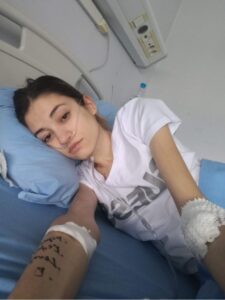Bulgarian cystic fibrosis patient joins international campaign standing up for the rights of patients to access essential medicines
Rositsa Malinova, a 22-year-old resident of Pazardzhik, Bulgaria, is taking on the challenge of her lifetime, to try to save her own life after she was refused compassionate access to life saving drugs. She has been writing to local authorities and has recently appeared on nation television to make her voice heard.
Rositsa has cystic fibrosis (CF) a genetic condition that causes thick, sticky mucus to build up in the lungs and other organs. The mucus leads to inflammation and infection, causing persistent lung infections and progressively limits the ability to breathe over time. The disease can also affect the pancreas and digestive system, meaning that Rositsa finds it extremely hard to maintain a healthy weight.
 Rositsa needs access to life-saving drugs – known as CFTR modulator therapies. These drugs are produced by American company Vertex Pharmaceuticals and they are very expensive – effectively meaning that many countries cannot afford to negotiate a deal to supply them. As in many other countries around the world, Rositsa and other CF patients find themselves caught in a stand-off between their own government and Vertex Pharmaceuticals. With her health failing, Rositsa simply does not have the time to wait for a resolution to this issue.
Rositsa needs access to life-saving drugs – known as CFTR modulator therapies. These drugs are produced by American company Vertex Pharmaceuticals and they are very expensive – effectively meaning that many countries cannot afford to negotiate a deal to supply them. As in many other countries around the world, Rositsa and other CF patients find themselves caught in a stand-off between their own government and Vertex Pharmaceuticals. With her health failing, Rositsa simply does not have the time to wait for a resolution to this issue.
But an international campaign ‘Vertex Save Us’ has inspired Rositsa to speak out on behalf of herself and fellow CF patients.
Vertex Save Us (VSU) www.vertexsaveus.org is a global coalition of patients and their families affected by the life-threatening and debilitating condition cystic fibrosis. The group have recently submitted a complaint about the manufacturer Vertex Pharmaceuticals to the UN Human Rights Special Rapporteur for Health at the UN Human Rights High Commission.
In an unprecedented move, the group asserts that the pharmaceutical company is causing harm, often fatal, through a prohibitive pricing and distribution strategy for life-saving drugs that obstructs patient’s right to the highest attainable level of health, and with not adhering to UN Guidelines for Pharmaceutical companies in relation to access to medicines.
Because there is no heel prick test in Bulgaria, Rositsa was not diagnosed with cystic fibrosis until she was 12 – by that time severe damage had been inflicted on her lungs. She had just 60% lung function when she was diagnosed.
A the age of 20, Rositsa was placed on the national lung transplant waiting list. However, Bulgaria doesn’t have a lung transplant program and doesn’t perform transplants.
What the country did have is a deal with Eurotransplant, an international collaborative organisation that is responsible for the allocation of donor organs in a number of countries – but that deal seems to have expired in 2017/18.

“I had to quit university because I’m always sick,” said Rositsa. “This year I’ve been admitted five times into hospital. Every day is a fight when your lung capacity is under 20%. Now with Kaftrio in the game, I thought things are going to change. But not if you’re from Eastern Europe. Innovative therapies usually arrive in Bulgaria with two years delay, because the legal procedure is far too clumsy. By the time Kaftrio is available in my country I will be long gone. The only chance I have is compassionate access, which my doctors don’t think I would be granted.”
“We don’t have CF specialists or adult cystic fibrosis centres. What we have is a centre for the children, but when you turn 18 you end up on the street literally. No hospital wants cystic fibrosis patients, because our antibiotics are expensive. I don’t have a team or doctor I can call when I’m sick. I read up about problems or ask other patients for advice.”
Rositsa says that cystic fibrosis patients are given creon, pulmozyme and one antibiotic for nebulisers. Any additional medications and supplements have to be funded by the patients or their families. She personally pays for vitamins and hypertonic solution as well as a heart medication and additional antibiotics like azythromicin. Many of these have to be imported, making them more expensive.
“When I have to have intravenous antibiotics I buy the drugs to use at home, as the maximum stay for pulmonary patients in hospital is 12 days,” said Rositsa. “Adult pulmonologists here haven’t heard of Kaftrio and don’t want to send a request to Vertex Pharmaceuticals. They are afraid to take responsibility and risk their career.”

“My doctor applied for compassionate access to Vertex’s drugs but I was refused. They said there is no compassionate access scheme in Bulgaria. If it wasn’t for the ‘Vertex Save Us’ campaign I would be sitting here, still thinking I don’t deserve access to these drugs and it’s not meant to happen in countries like Bulgaria. But the campaign has shown me that I do not have to accept this unhappy situation, so I will continue to fight for access to the medicines that can help to save my life and let me spend more time with my family and friends.”
VSU wrote to Vertex on 25th November with details of six urgent cases of patients in different countries with life-threatening illness, whose lives it claims could be saved with treatment by the company’s CF drugs, and highlighted the story of Juliet Hubbard, a patient in New Zealand who died after begging repeatedly for compassionate access to Trikafta (called Kaftrio in Europe).
The drug was given the highest evidence ‘A’ by ICER in USA, but it also stated: ‘Trikafta is a remarkable advance for the majority of people living with CF. Unfortunately, the manufacturer has leveraged its monopoly to set a price — costing many millions of dollars over the lifetime of an average patient — that is far out of proportion to the treatment’s substantial benefits.’* Trikafta/Kaftrio is only reimbursed in USA, Germany, Denmark, UK and Slovenia.
VSU stated in its letter: ‘Urgent action is needed to prevent needless harm and loss of life amongst people with CF around the world. These people, and many others within our membership, are facing immediate – and avoidable – threat to their lives through CF-related illness and extreme vulnerability to severe Covid-19 due to their lung disease.’ The group asserts that ‘The position, which Vertex has chosen, to price its drugs to be unaffordable to a high proportion of patients and to not supply free drugs to those with immediately life-threatening CF wherever they live, is morally indefensible. It is particularly unjustifiable in light of the considerable return Vertex has achieved already with $6.2bn cash in the bank and over $6bn in revenue predicted from CF drugs worldwide this year alone.’
VSU was formed in October by CF families in the UK who successfully fought a 5 year-long battle to gain access to Vertex CF drugs on the NHS. Now it is a 3000 strong pressure group with members in 52 countries and its growing fast, gaining high level supporters like Dr. Paul Quinton, who discovered the basic fault in CF in the 1980’s and without whom Vertex drugs would not exist. Dr. Quinton calls on Vertex to establish wider access to its drugs ‘in order to avoid charges of extortion’.
Initially, VSU wrote proposing that Vertex Pharmaceuticals set up a global access plan, which would include affordable pricing, a compassionate fund for the dying and voluntary licensing where it does not see a commercial pathway. The group was disappointed with the response it received from Vertex CEO Reshma Kewalramani. In this latest letter it states ‘As a result, we are forced to take these cases, and those of many others, as a formal complaint to the UN Human Rights High Commission on Human Rights Special Rapporteur for Health.’
The universal right to health includes access to essential medicines, which in this case, is being obstructed by Vertex’s prohibitive pricing and distribution strategy.’
Watch a video of Rositsa below:
.@RositsaMalinova was featured in the daily newsletter of @POLITICOEurope today. Thank you @carlomartu for highlighting the inequity of healthcare for #cysticfibrosis patients in countries like Bulgaria.@RositsaMalinova has no choice but to fundraise: https://t.co/dycW04YbVy pic.twitter.com/vQr3ggd7uM
— Strawfie Challenge (@strawfie) December 8, 2020


